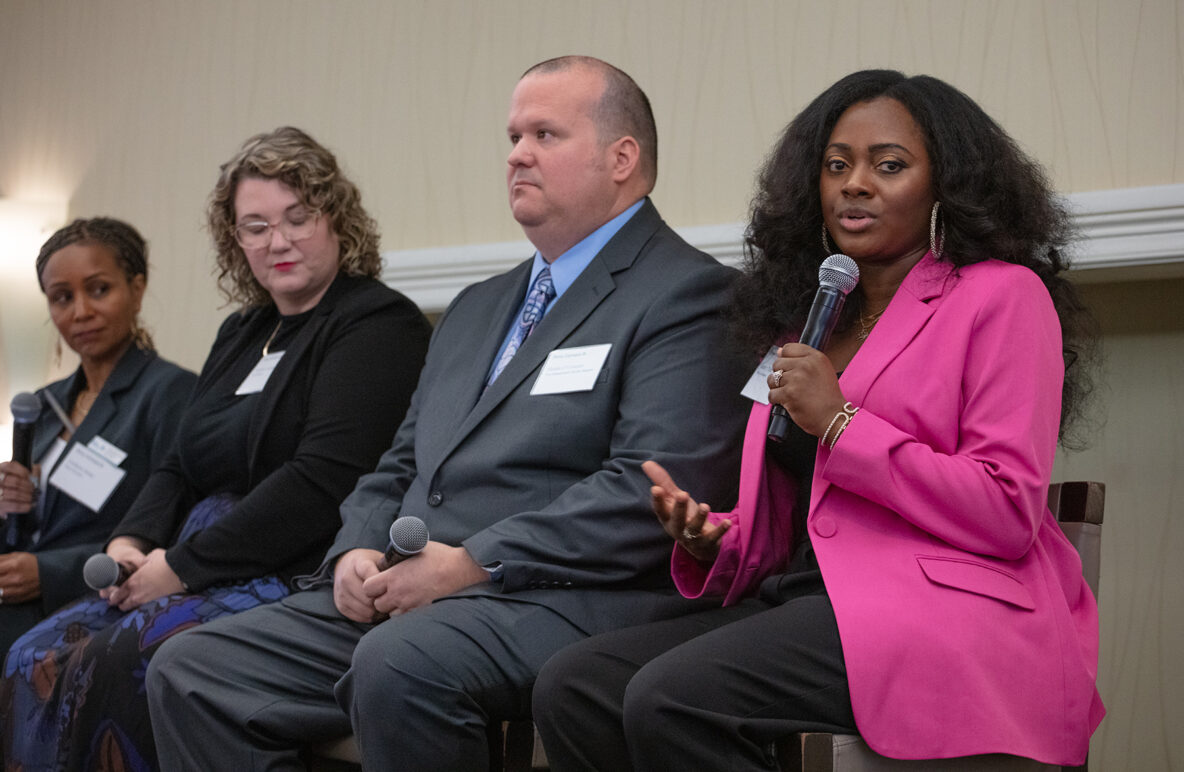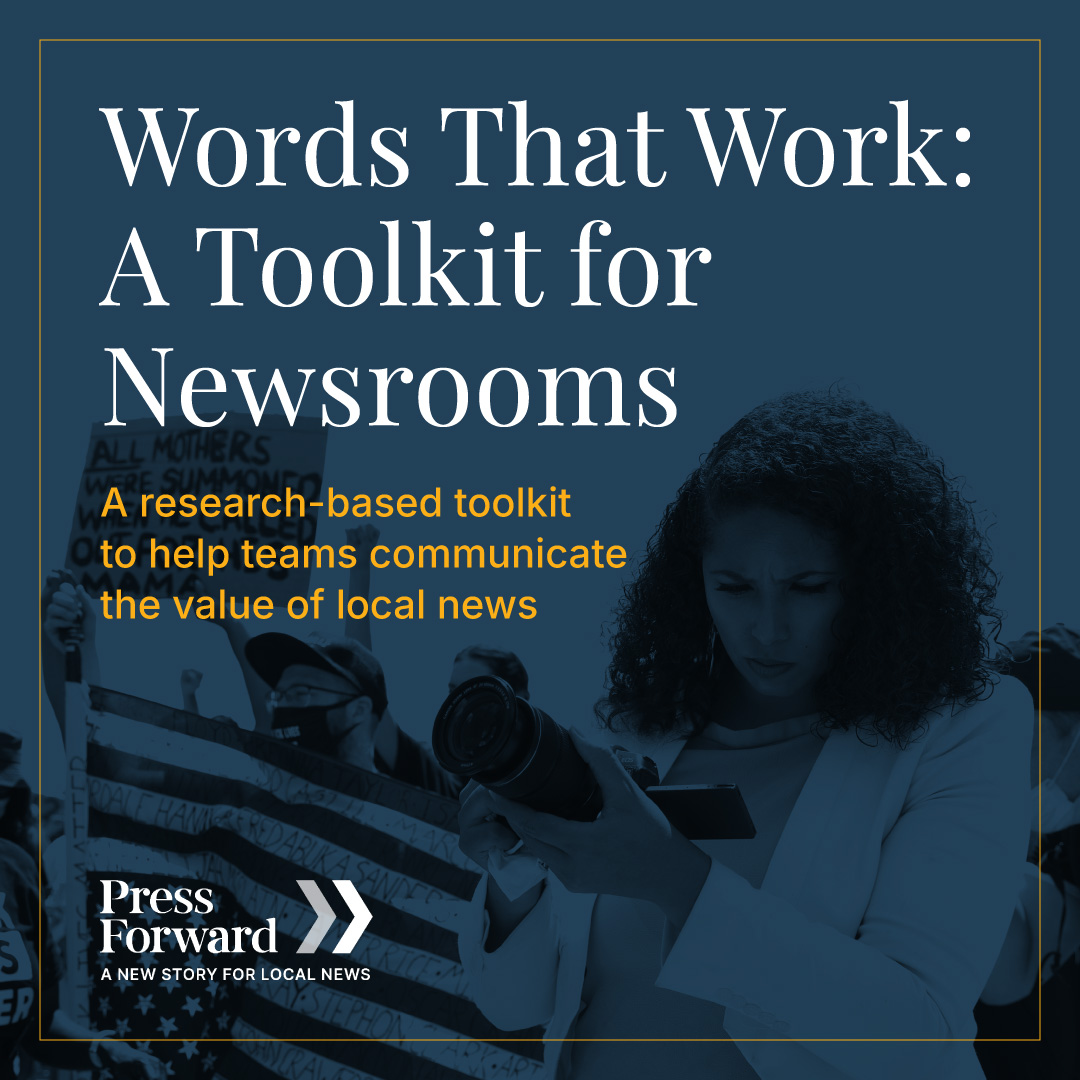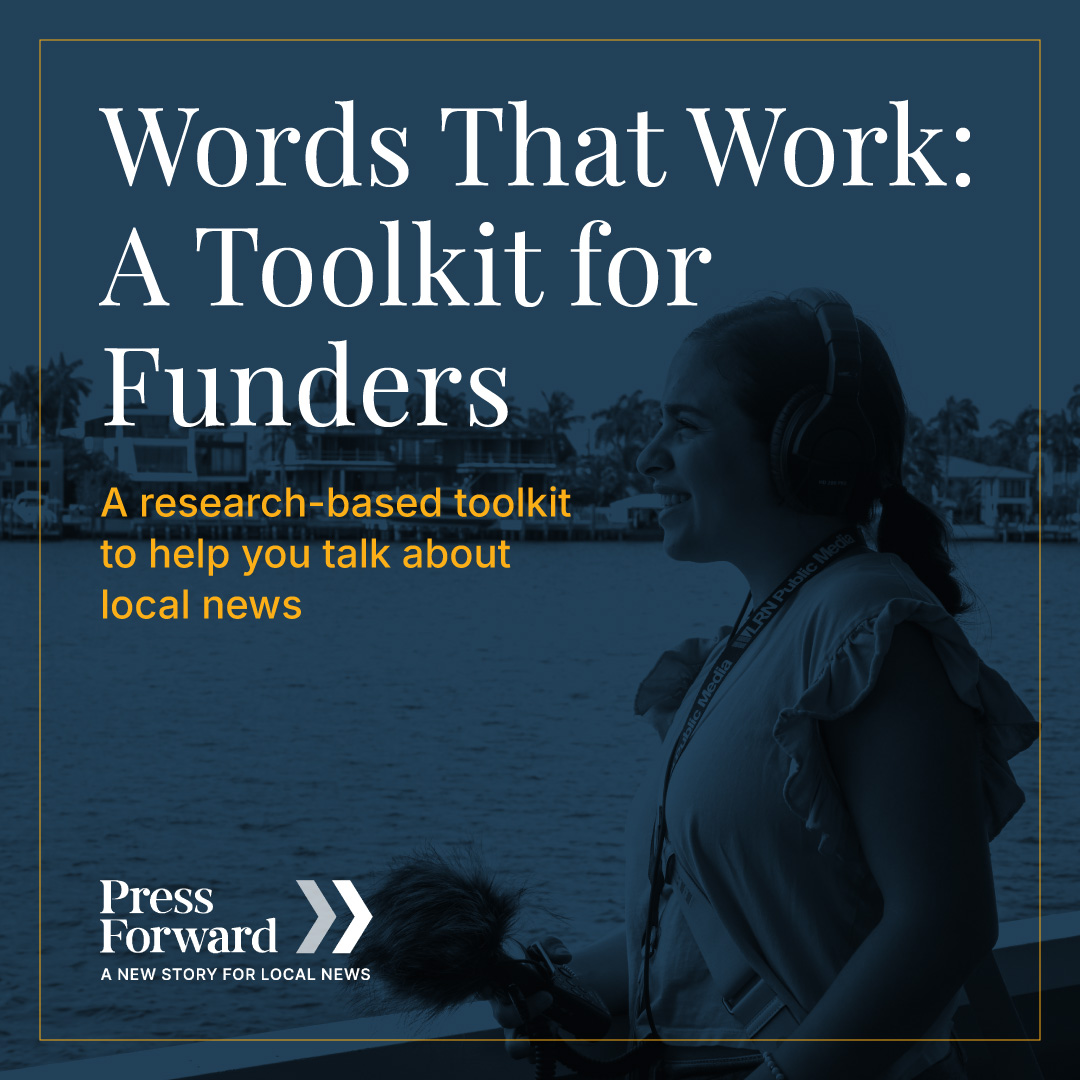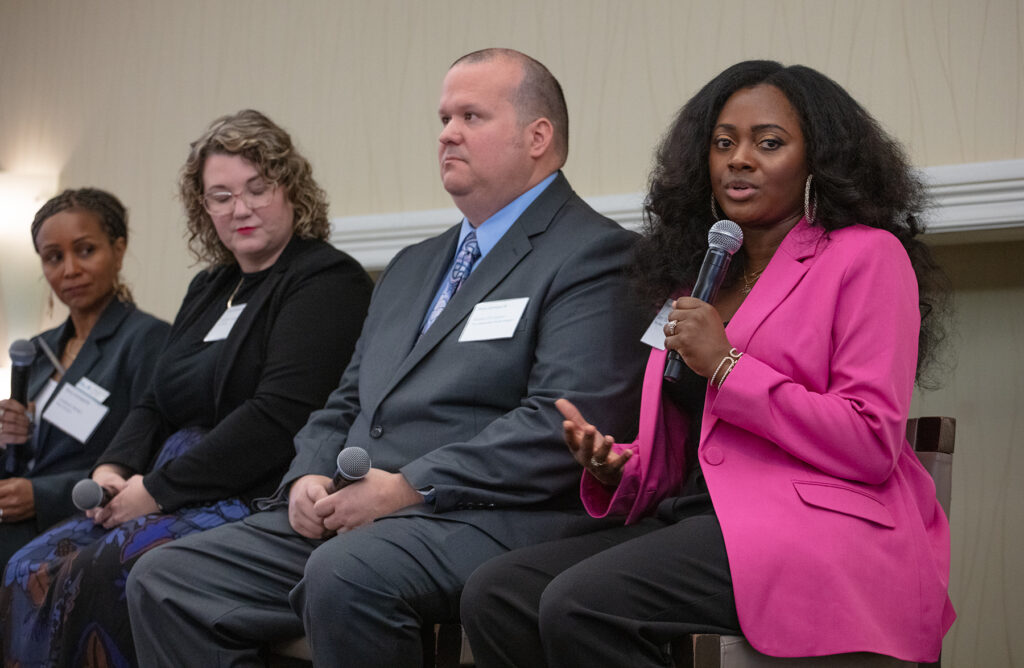
Janey Tate talks about her Miami-based publication Hy-Lo News at a Press Forward event.
By Marika Lynch
Reporters and editors know this instinctively: Words shape perceptions and drive action. That’s true in the newsroom, where word choice is the foundation of clear, contextual, and nuanced reporting. The same principle applies when news organizations make the case to their readers and supporters for subscriptions, memberships, or donations.
The way you frame the message can inspire people to become local news champions — or cause them to tune out. That’s why Press Forward partnered with strategic communications firm Beekeeper Group to conduct a national poll, convene focus groups, and test messages extensively. The goal: to find approaches that build a compelling case for local news while upholding editorial independence and honoring newsrooms’ role in their communities.
Today, we’re releasing two guides — one for newsrooms and local news practitioners, and another for funders — each designed to strengthen community support for local journalism.
Both emphasize a shift in narrative: moving away from journalism’s financial crisis and toward the community benefits that local news delivers.
Messaging tools for newsrooms and funders on local news
Each guide offers a meaty set of insights on how to communicate the value of local news — tailored across demographics, political perspectives, and community contexts, from rural towns to suburban neighborhoods to major cities.
The newsroom guide, in particular:
- Offers research-backed language to strengthen funding appeals and grant applications
- Shows how to highlight your newsroom’s community role without compromising journalistic standards
- Provides ready responses to common questions you’re likely to face
At Press Forward, our mission is to strengthen local news so communities stay informed, connected and engaged. With tools like these, we aim to build a broader base of support for local news, so that news organizations become more sustainable and resilient in the face of change.
Join us on October 15 at 12 p.m. EST for a webinar for newsrooms, to get practical tips and tools on making the case for local news.
Our research shows that a wide range of people in communities nationwide already care deeply about local news and information. In a national poll of 3,000 Americans:
- 87% said local news matters to them personally
- 67% said they use local news to make everyday decisions
Those are powerful numbers. As the report explains: “People already value what you do; your role is to help them see why sustaining it matters. By choosing words that connect, framing your work as essential, and inviting others to invest in something bigger than themselves, you can turn appreciation into action.”
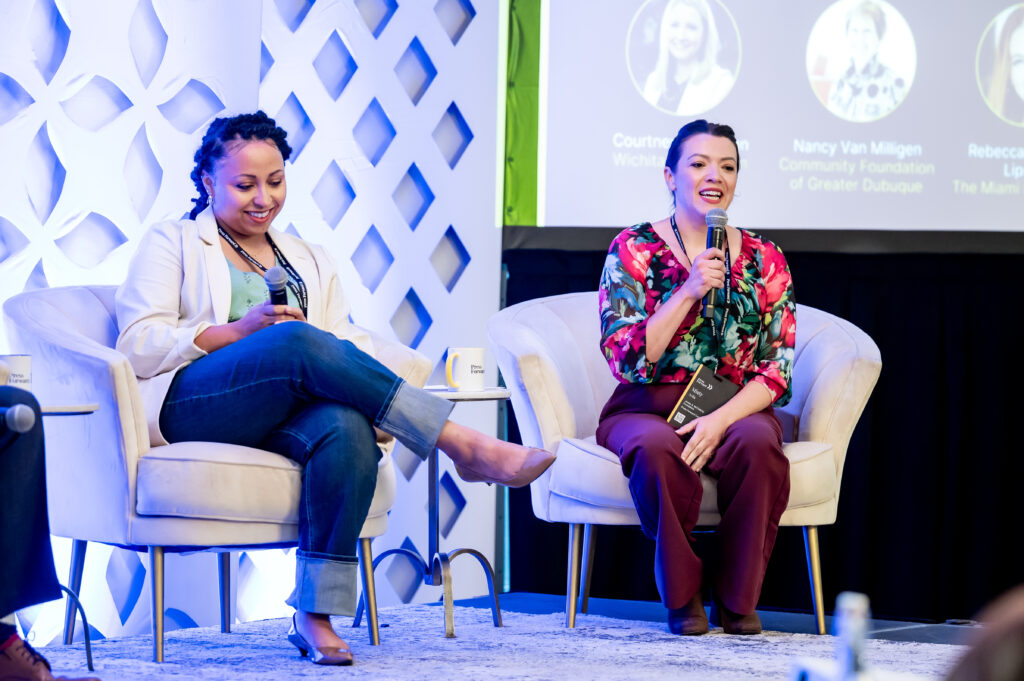
Press Forward chapter leaders advocate for local news in their communities.
Focusing on local news’ community benefit
Here’s a closer look at what the research revealed.
Focus on what only local news can offer: One finding stood out: Americans overwhelmingly value local news and information — and 8 in 10 say they can easily find it. That makes sense in today’s world, where we’re swimming in information from the moment we pick up our phones: neighborhood chats, community groups, the local parks department, engaged residents, and, yes, local reporters.
This patchwork of platforms and sources is useful in daily life. But only newsrooms can deliver the verified, in-depth accountability reporting that helps communities make real decisions. That’s the gap only newsrooms can fill: delivering quality, depth, and accountability that no other source can match.
Shift from crisis to community benefit: Much of the current narrative around local news leads with the financial crisis and the hollowing out of newsrooms — and with good reason. Most Americans still don’t know about local news’ financial troubles. When asked, many assume advertising should still cover the bills. The statistics are alarming and bring the crisis into stark relief.
But leading with a crisis can spark fatigue or anxiety. A stronger approach is to move from a “save journalism” plea to one that emphasizes how trusted local news strengthens communities.
Beginning with the community’s benefit taps into what people already care about — how local news affects their daily lives. Then, ground that message in impact: whether it’s reporting that influenced a policy change, or coverage that became a lifeline during an emergency.
Choose words wisely: Some words resonate with the public. Others raise alarms or fall flat.
- “Local news and information” works. It consistently performs well across all groups. Unfortunately, the word “journalism” does not. While people overwhelmingly value what journalism does, the label itself is often linked with bias, opinion, or national politics. On a personal note, as someone who spent more than a dozen years in newsrooms, this one was hard to stomach. Journalists are my people. But I have to remember, it’s not the work audiences reject, it’s the label.
- “Democracy” doesn’t work — but its purpose does. Some 93% of Americans say reliable local news is essential for democracy. Yet many react negatively to messaging that leans on the word itself. Years of partisan framing have left “democracy” sounding fatigued and polarizing, even for those who believe in its importance.
Actionable tools for appeals — or conversations with funding partners
These insights are just the beginning. The guides go much deeper, whether you’re a newsroom making the case to your community or a funder working to strengthen local journalism nationwide.
At their core, both guides reflect the same truth: sustaining local news isn’t about rescuing an institution in crisis. It’s about ensuring communities have the trusted information they need to thrive.
We encourage you to put these findings to work. Use the language in your next membership campaign, reference it in your next grant proposal, or bring it into conversations with partners and supporters. And let us know what resonates. Your feedback helps us continue to refine and strengthen these tools for the field.
Marika Lynch is the communications lead for Press Forward.
